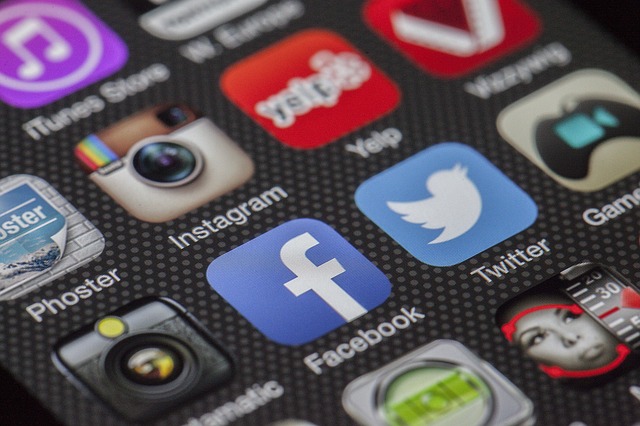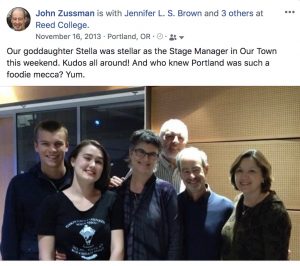
I resisted the lure of social media through the aughts, despite frequent requests from my friend Sam to “please join my network” on Plaxo (remember Plaxo?) and later on LinkedIn. Patti and I were mostly retired from our technical communications careers by then and spent our days (and some nights) writing screenplays. Few Hollywood people were on LinkedIn back then, apparently preferring old-style networking methods like phone calls, movie premieres, and power lunches at Chateau Marmont and the Polo Lounge.
Each time I respond to a post, Facebook uses it to categorize and phenotype me, to slice and dice my likes and comments and sell them to the highest bidder.
Then, in 2008, as the financial meltdown took hold, it seemed useful to have an actual income. I began to reach out to old contacts in high tech. Almost as an afterthought, I set up a cursory profile on LinkedIn.
A week later, I heard from Debra, a colleague from Oracle in the ‘90s. “I’m at a new startup,” she explained, “and I need someone to do our beta documentation. I thought of you but didn’t know how to contact you. Then I found you on LinkedIn!” I ended up completing a four-month contract with her company and it smoothed my re-entry into technical publications.
Magic. At least it seemed that way. It made me a believer in social media.
Still, I resisted joining Facebook. Who needed to know what my friends had for lunch (as the Facebook stereotype then had it)? But in the fall of 2011, my goddaughter Stella went off to college, and I figured the only way I’d know what she was up to was through Facebook. So I joined.

A joyful early post: visiting Stella at college.
And it did help me keep up with Stella at college—her roommates and friends, her art and theater, her studies and creative activities. I also found other friends and relatives, and Facebook helped me keep up with them too. Gingerly, I began to post on my own. I found community there, and it became a good place to share Retrospect stories. More magic.
Stella, like most of her generation, has largely dropped off Facebook. But her mother, Jennifer, hasn’t. She—and several other friends—continue to post or share often out of joy and passion and outrage, with which I usually agree. It’s hard not to like or love their posts, or add a comment expressing support or community. Yet I know that, each time I do, Facebook uses it to categorize and phenotype me, to slice and dice my likes and comments and sell them to the highest bidder—actually to any bidder—to use for their own purposes.
As we now understand, this categorization, slicing, and dicing is dividing our society and undermining our democracy. I have one friend, a screenwriting coach, who uses his Facebook feed to express liberal political views, knowing he will provoke a backlash from his conservative friends and followers, which he rationally counters, even though none are ever convinced. It’s an endless, fruitless cycle. Another friend, a writer, committed progressive, and fervent Bernie bro, was so outraged when emails revealed that the DNC had its thumb on the scale for Hillary that he refused to support her and voted for Jill Stein instead. We now know that those emails were hacked by Russian agents and posted, fanned, and amplified by Russian bots in a subversive, illegal, and ultimately successful attempt to undermine support for Hillary. How many others like him, in Wisconsin and Michigan and Pennsylvania, did it take to swing the election for Trump?
I recently learned about an alternative social network called MeWe that promises “no ads, no spyware, no B.S.” Apparently, it doesn’t track you or sell your data. MeWe was founded by Mark Weinstein, a prominent privacy advocate who was so enraged by Mark Zuckerberg’s declaration that “privacy is a social norm of the past” that he created an engineering project to prove him wrong. It sounds like the much-needed anti-Facebook. But a social network is only useful if your friends are on it too. Does anyone have experience with MeWe? Anyone interested in trying it out?
John Unger Zussman is a creative and corporate storyteller and a co-founder of Retrospect.



Going to try it
I hate Facebook
xo
So LinkedIn proved useful. That’s the dilemma. Some of social media can be useful. We use Uber to get around London. Except during Surge pricing, it is much cheaper than the black cabs. When in his special ed school, a teacher tried to get Jeffrey and all the kids in his class (who were all tech fiends) to connect via Friendster (remember that one; no one else does either…it was soon overwhelmed by Facebook). MeWe sounds lovely, but trying to slay the giant Facebook is no small feat. They’ve got a running start and a billion users. It’s where most people (though not our kids) are. They are on Instagram if they are anywhere. Twitter is the really evil one. Look at how our country is being controlled by a strange orange man with itchy fingers, making proclamations and denunciations, early in the morning, 144 characters at a time (yes, I know, more characters now, and sometimes others are writing for him – how weird it that!) and so many lies, trolls and bots. The truth is lost somewhere in cyberspace.